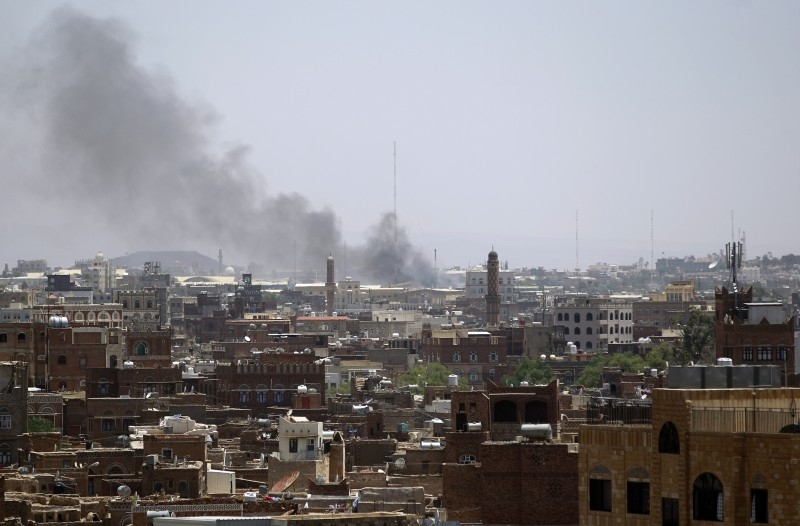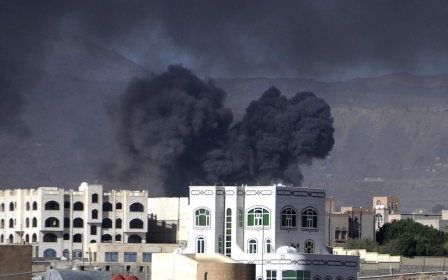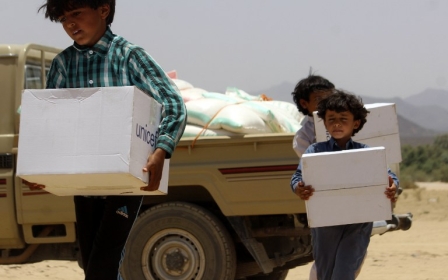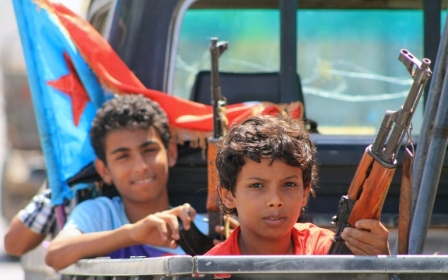Saudi-mandated ceasefire begins in Yemen

A Saudi-initiated humanitarian truce took effect in Yemen late Tuesday, after 24 hours of intensive bombing by a military coalition led by the kingdom targeting Iran-backed rebels.
But the Saudi-led coalition warned the Shiite Huthi rebels it stood ready to strike back at any violations of the pause that comes after more than six weeks of bombing.
Shortly after the truce began, guns fell relatively silent in the southern city of Aden which has seen heavy combat between pro-government forces, and the Huthis and their allies.
The five-day ceasefire, which started at 11:00 pm (2000 GMT), aims to allow deliveries of desperately needed relief supplies, although aid groups have already warned they need more time.
Explosions at an arms depot in Sanaa, the capital, which has been hit by Saudi-led coalition strikes since Monday killed at least 69 people and wounded 250, mostly civilians, an official said.
The blasts at Mount Noqum, on the eastern outskirts of the rebel-held capital, lasted until midday Tuesday, when a fresh wave of strikes hit the depot, an AFP correspondent said.
UNESCO Director General Irina Bokova condemned "severe damage" caused to heritage sites in Yemen, such as Sanaa's old city, during intense bombing.
She called on "all parties to keep cultural heritage out of the conflict".
Quiet returned to Sanaa as the newly appointed UN envoy to Yemen, Ismail Ould Cheikh Ahmed, arrived for talks with the Shiite Houthi rebels, ahead of other meetings this week, possibly in Iran.
"We are not ready to announce a date for talks but that remains the goal," UN spokesman Stephane Dujarric said, adding that "the fact that he got into Sanaa and is meeting with the Huthis today is a step in the right direction."
However, the presence of an Iranian cargo ship heading towards Yemen late on Tuesday raised concerns, though Iranian officials stated it simply contained aid packages and doctors.
The head of the Red Crescent Society of Iran, Amir Mohsen Ziya’ee, said, according to Press TV, that “based on international regulations, no one can inspect a vessel that is moving in international waters carrying the flag of a country”, in what appeared to be a warning against any attempts to hinder the vessel's passage.
He said that the vessel, the Iran Shahed, carried physicians and contained “2,500 tons of much-needed aid, including food, medical supplies and tents”.
UN concern at toll
Tensions between Sunni-dominated Saudi Arabia and Shiite Iran have soared since the launch of the aerial campaign on 26 March.
Riyadh has repeatedly accused Iran of arming and funding anti-government Houthi rebels, a charge Tehran denies.
Saudi Foreign Minister Adel al-Jubeir stated on Tuesday that a summit between US and Gulf leaders this week would focus on the alleged threat of Iran to the stability of the Middle East.
"We see Iranian support for terrorist organisations and facilitating the work of terrorist organisations, so the challenge will be in how to coordinate US-Gulf efforts in order to collectively face these aggressive moves on the part of Iran," al-Jubeir said, according to the Saudi Press Agency.
He also added, however, that the Yemen truce could be extended if "(aid deliveries) succeeded and if the Houthis and their allies don't engage in hostile activities".
The Houthis have promised to respond "positively" to the truce, and allied troops loyal to ousted president Ali Abdullah Saleh have accepted the proposed ceasefire.
The truce is the first since the Riyadh-led alliance launched the air war aimed at restoring the crumbling authority of exiled President Abd Rabbuh Mansour Hadi.
The ceasefire has strong backing from Washington, which has said it could be extended.
But doubts have been cast on the initiative.
"There might be a ceasefire but it won't end the conflict," said a Western diplomatic source. "I'd be surprised if it was honoured across Yemen. There will still be skirmishes going on."
The UN has expressed deep concern about the civilian death toll from the Saudi-led bombing as well as the humanitarian impact of an air and sea blockade imposed by the coalition.
It says more than 1,500 people have died in the conflict since late March.
The Houthis, who hail from Yemen's mountainous north near the border with Saudi Arabia, overran Sanaa in September and extended their control to other regions.
Hadi fled to Riyadh as the rebels closed in on his refuge in the main southern city of Aden, where clashes between his opponents and supporters have shown no sign of relenting.
'Catastrophic' humanitarian situation
Clashes raged in the southern provinces of Abyan, Shabwa and Daleh, as well as Jawf farther north, residents said.
Bloody clashes were also reported in the central province of Baida, as well as coalition airstrikes on a Houthi-held camp in Marib province, east of Sanaa.
Air raids rocked the Houthi stronghold province of Saada late Tuesday ahead of the truce, according to witnesses.
The Red Cross said a longer ceasefire was needed.
"We hope the truce would last longer, and become permanent. And we hope all sides respect it," spokesman Adnan Hizam said, lamenting a "catastrophic" humanitarian situation.
Human Rights Watch warned the Houthis had intensified recruitment of children in violation of international law.
Commanders of the rebels and other groups "should stop using children or risk prosecution for war crimes", HRW said.
It said Islamist and tribal militias as well as al-Qaeda were also recruiting children.
Al-Qaeda has exploited the growing turmoil to consolidate its grip on Yemen's southeastern province of Hadramawt.
A provincial commander, Maamoun Hatem who headed al-Qaeda in the central province of Ibb, was among four militants killed Monday in an apparent US drone attack in Hadramawt, an official said.
Another drone strike in Shabwa killed three insurgents.
Meanwhile, the coalition denied rebel claims they had shot down a Moroccan F-16 warplane, which crashed in Yemen at the weekend.
"We are definitely sure it wasn't shot down," said Brigadier General Ahmed al-Assiri.
Middle East Eye propose une couverture et une analyse indépendantes et incomparables du Moyen-Orient, de l’Afrique du Nord et d’autres régions du monde. Pour en savoir plus sur la reprise de ce contenu et les frais qui s’appliquent, veuillez remplir ce formulaire [en anglais]. Pour en savoir plus sur MEE, cliquez ici [en anglais].




